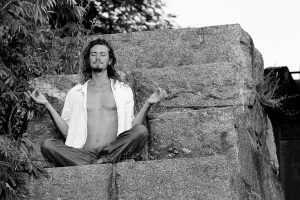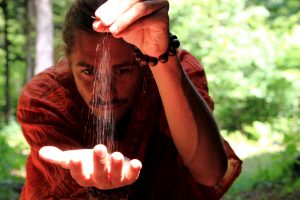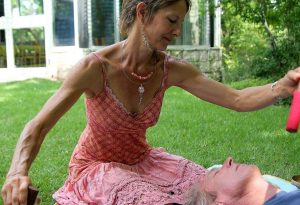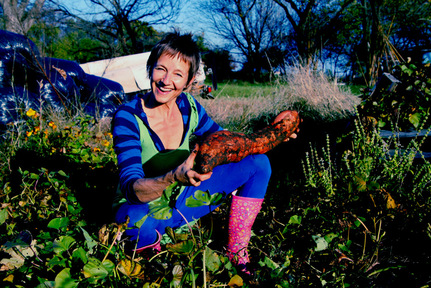Eaker describes spirituality and community
Quinn Eaker, though he did not originally own the land that GOE sits on, was gifted the land by Shellie Smith two years after they started to build GOE from the ground-up.

Before he created the eco-village, he gave many speeches across several platforms: local, national and international TV and radio shows. These speeches focused on environmental sustainability and how to live sustainable.
During the past couple of years, he has been on the cover of the Dallas Observer twice, and spoken at festivals and public events.
While talking about GOE, Eaker says, “Here we live freely, abundantly and easily. Our purpose is to share with the world the living reality of a sustainable community, so that others may open to embrace living life fully.”
He went on to mention that GOE is a place to visit for inspiration, healing and conscious evolution.

“Consciously entering the GOE is an opportunity to witness the reality of life,” he said. “It’s possible to eat like royalty every day without money. It’s possible to have more than enough, including money, without working in the system. It’s possible to be healthy and immune to disease.”
This, he goes on to summarize, is a part of the daily life at GOE.
Life at the GOE, while different from the sprawling metropolis that lays just outside of the gates, does include things that are seen in every house.
Within the main house is a fully stocked kitchen and a big dining room table. There’s even heat and AC, for those that wish to use it.
The difference is: Eaker sees no use for these things.
Though Eaker used to live a ‘normal’ life (he attended high school, was a model in Hollywood at one point, and even considered joining the army), he realized when he was 17 that he wanted to create a sustainable life for himself and others.
“Ever since then, I have dedicated my life to creating a paradise,” he said. “I have everything. I have more than enough food, water, and I have housing. I have this community, and we all love each other. Every day when I wake up, I have one goal, and that is to be at peace with life itself.”
The second goal he is faced with everyday is to share this peace with everyone else and to make his message global.
“The first thing you have to do, when you’re trying to be at peace with yourself, is to be real with who you are,” Eaker said. “Authenticity is a huge part of sustainable living. You can’t blame the environment or other people for how you feel. You can only blame your self, because there’s a disconnection with your own being.”
If you’re like me, you might wonder, ‘Just how do I get in connection with myself?’ It seems relatively simple when Eaker is talking about it, but I can’t help but wonder, is it actually that easy?
“You have to be accountable for what you say. If you say you’re going to do something, do it. If you aren’t going to do it, don’t,” Eaker explained. “You have to evolve into a much happier, clearer version of yourself, or else the vortex will spit you out.”
Eaker goes on to say this happens when people focus too much on outside circumstances and consequences.
“A lot of people focus too much on outside consequences, like the weather, or people’s responses to them, and they react to those things,” he said. “You can’t focus on those things. You have to create a true connection with life itself, within yourself.”
The most important part of living a spiritual life? Eaker says, just go with the flow.
“I just go and let the universe open up to me,” Eaker says. “I always have some new profound experience. That’s what my life is about now, a moment-to-moment, day-to-day existence.”
–
Smith explains how community functions daily

In another interview, Shellie Smith talks about the set up of the community, how life was in the community at first, and how the community functions on a day-to-day basis.
Though I asked to have an interview over the phone, Skype, or elsewhere, the only response I received was through email – and Smith did not say she was the one who answered my questions, at least not until I asked so I could use the quotes.
I had also tried for several weeks to conduct this phone or Skype interview. I even offered to meet Smith or Eaker outside of GOE’s gates or elsewhere, but received no answer in response.
“When this project first started it was amazing even still. Yes there was less housing, less food and more infrastructure that had to be completed, however, we work all day long, every day regardless of how much we have achieved,” Smith said. “Our work is never complete until no one is left hungry, uneducated, under clothed, without housing or friends. We work 12-16 hours a day every day, regardless of if we are more successful than ever before.”
Though Smith said they work everyday to better themselves, she admitted there have been failures. However, she did not state what kind of failures she was referencing to.
“There are failures every day. None of us are perfect, life is full of mistakes,” she said. “Thankfully we are committed every day to making amends for our mistakes and evolving so we are better than ever before.”
With failures in mind, Eaker, the appointed leader, works to lead everyone in the ways he sees fit.
“Though Quinn is the founder, creator and manager of the GOE, he works and dedicates every day to helping people,” Smith said. “Everyone at the community is considered and everyone’s life is improved.”
While I do believe everyone is considered, I think Smith saying everyone’s life is improved is biased and doesn’t take into account what others may think. This is another part of the language specific to the community. Questions arise, like: How? Why? However, when she responded, she didn’t divulge any answers to those questions.
As Eaker had said previously, life is improved when a person is in tune with their spirituality. And although the community is not religious, God was an influence in the creation of the community.
“The inspiration for The Garden of Eden came from nature and God. There is more than enough of everything,” Smith explained. “Everything we could ever want or need is already available to us and humanity is simply wasting and forsaking the blessings of life itself.”
On the same note, she said things available to them (a.k.a, the garden) require work. Lots of work.

“There are many day-to-day responsibilities. We compost all organic matter and recycle all inorganic matter. This requires a lot of work every day. We divide up these responsibilities to various members of the community,” Smith said. “There is a lot of work that has to be done every day [when] living a sustainable life.”
As stated elsewhere, members must work 50 hours a week. This work is in exchange for room and board and Internet access, among other things. However, members can work outside of the community. Similarly, the community income shares, just as they share most other things.
In essence, she said there are a lot of responsibilities, but the work is evenly shared.
“Every day there are responsibilities, but the great thing about community is that there is a whole community to do what needs to be done,” she said.
Here is audio for a few key points of the first interview: